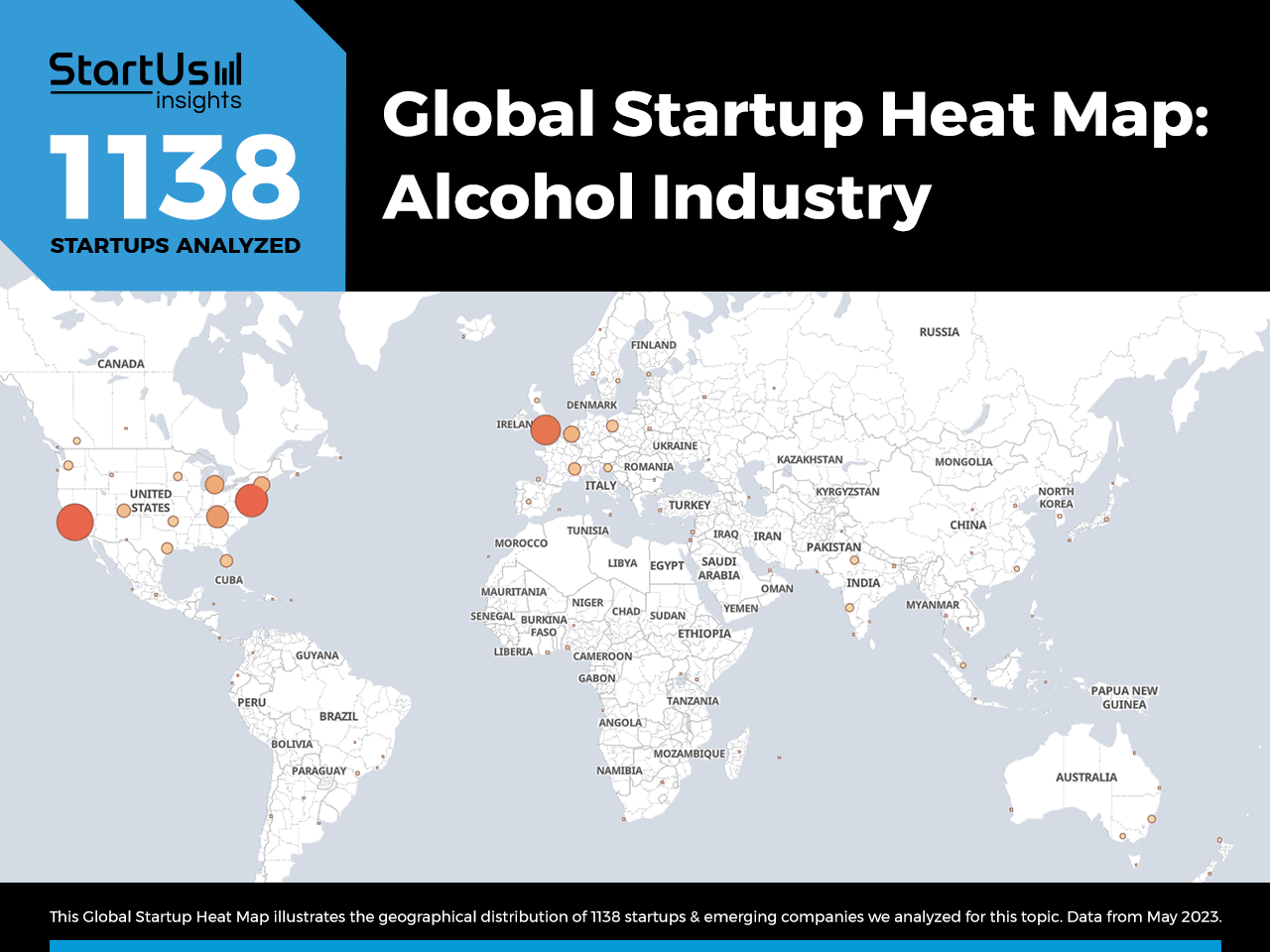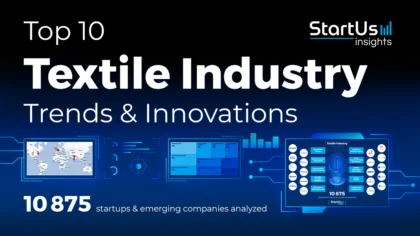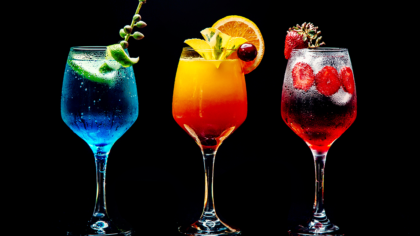Accelerate Productivity in 2025
Reignite Growth Despite the Global Slowdown
Technological advancements play a significant role in transforming the way alcoholic beverages are produced, distributed, and consumed. For instance, smart sensors enable manufacturers to monitor the quality and temperature during the brewing and fermentation process. Personalized and on-demand experiences are becoming increasingly popular, with companies leveraging technology to create unique and interactive experiences like virtual tastings. This industry research focuses on the 10 up-and-coming alcohol industry trends based on our analysis of 1130+ startups and scaleups. Their solutions range from eCommerce integration and social media engagement to smart distilleries and robotic alcohol dispensing. Read more to explore all trends and how they advance alcohol production and distribution.
Innovation Map outlines the Top 10 Alcohol Industry Trends & 20 Promising Startups
For this in-depth research on the Top Alcohol Industry Trends & Startups, we analyzed a sample of 1138 global startups & scaleups. This data-driven research provides innovation intelligence that helps you improve strategic decision-making by giving you an overview of emerging technologies in the alcohol and spirits industry. In the Alcohol Industry Innovation Map, you get a comprehensive overview of the innovation trends & startups that impact your company.
These insights are derived by working with our Big Data & Artificial Intelligence-powered StartUs Insights Discovery Platform, covering 3 790 000+ startups & scaleups globally. As the world’s largest resource for data on emerging companies, the SaaS platform enables you to identify relevant technologies and industry trends quickly & exhaustively.
Tree Map reveals the Impact of the Top 1138 Alcohol Industry Trends
Based on the Alcohol Industry Innovation Map, the Tree Map below illustrates the impact of the Top Alcohol Industry Trends in 2023. Startups and scaleups are transforming the spirits industry using eCommerce integration and social media engagement, connecting brands directly with customers and making online sales. Sustainable spirits and biotech enhancement allows for environmentally conscious production and experimentation, offering new flavors and ingredients. Alcohol brands use big data and analytics to better understand customer preferences and tailor products and marketing strategies accordingly. Further, blockchain provides an added layer of security and trust for premium spirits while simplifying the traceability of origin. Smart distilleries enable brewery automation, leading to optimized production. Brands utilize smart packaging and augmented reality (AR)-based experiences to communicate more effectively with consumers and create unique, memorable packages. Finally, Robotic alcohol dispensing brings automation and efficiency to bars and restaurants, streamlining the serving process and reducing waste.
Top 10 Alcohol Industry Trends in 2023
- eCommerce Integration
- Social Media Engagement
- Sustainable Spirits
- Big Data & Analytics
- Blockchain Authentication
- Smart Distilleries
- Biotech Enhancement
- AR-based Experiences
- Smart Packaging
- Robotic Alcohol Dispensing
Global Startup Heat Map covers 1138 Alcohol Industry Startups & Scaleups
The Global Startup Heat Map below highlights the global distribution of the 1138 exemplary startups & scaleups that we analyzed for this research. Created through the StartUs Insights Discovery Platform, the Heat Map reveals high startup activity in the US, followed by the UK. Below, you get to meet 20 out of these 1138 promising startups & scaleups as well as the solutions they develop. These alcohol industry startups are hand-picked based on criteria such as founding year, location, funding raised, & more. Depending on your specific needs, your top picks might look entirely different.
Top 10 Alcohol Industry Trends in 2023
1. eCommerce Integration
Moving to online sales channels provides the spirits and alcohol industries with new growth opportunities and a more convenient platform for customer engagement. eCommerce valuation within the alcohol industry rose due to the pandemic and changing consumer preferences. Many startups are tapping into this trend by creating innovative platforms and solutions that cater to the specific needs and nuances of B2B and B2C transactions in this sector. Online marketplaces allow consumers to buy alcoholic beverages from different brands and retailers. These marketplaces offer a convenient and centralized shopping experience, making it easier for consumers to discover new products and compare prices. Startups are also leveraging eCommerce to sell alcoholic beverages directly to consumers, bypassing traditional distribution channels.
CellarsMarket develops an Alcoholic Beverage Marketplace
Australian startup CellarsMarket offers an online marketplace that connects consumers with high-quality liquor and alcoholic drinks. The platform enables independent producers to register and sell spirits by offering them branded microsites with their own sub-domain names. CellarsMarket aids local spirit distilleries with brand marketing and customer support, as well as flexible shipping rates. The startup secures all transactions to ensure safety and traceability. It provides an outlet for alcoholic beverage brands and customers to discover new products and supports local businesses.
Tipple enables Direct-To-Consumer (D2C) Spirit Sales
Tipple is an Irish startup that allows alcohol brands to sell directly to consumers. It handles taxes and logistics for the brands, allowing them to focus on growing their online presence. The startup utilizes a cloud-based platform that integrates with the brands’ websites and automates customs clearance, pick-and-pack, and shipping processes. This solves major problems that alcohol brands experience when selling alcohol online, such as complex tax compliance and difficulty expanding into new markets. Tipple’s platform also features a dashboard that contains sales data, which provides customer insights. This assists beverage brands with creating more efficient marketing strategies and improving sales.
2. Social Media Engagement
Social media engagement helps alcoholic beverage brands boost their visibility among potential customers and improve sales. Alcoholic beverage brands leverage social media platforms to better market their offerings and identify market trends. AI chatbots and influencer marketing platforms create personalized and interactive experiences for their consumers. It also enables brands to measure and optimize their digital marketing campaigns. Moreover, social media analytics tools help businesses track their brands’ performance to create more optimized strategies. Startups create interactive content, such as immersive product demonstrations and virtual events, on social media to engage the audience. As a result, social media allows companies in the alcohol beverage industry to reach out to their target audience and grow their brand.
OpenBar offers a Spirits-based Social Media Platform
Italian startup OpenBar provides an eponymous social media platform that allows beverage companies, bars, and alcoholic drink brands to build connections. It enables consumers to send and receive drinks from their smartphones, join friends, and reach out to acquaintances. The platform also enables alcoholic beverage brands to communicate with their clients and staff as well as create one-to-one connections, attracting more customers. OpenBar uses QR codes to redeem drinks at participating venues and transfers payments to them every week.
Somm Says makes a Social Wine-Tasting Platform
Somm Says is a US-based social wine-tasting platform that allows wine professionals to create interactive experiences for their customers. The platform provides customers with professional wine-tasting notes. This challenges them to compare their perceptions and learn more about the wines. The startup uses a QR code system on the bottles, which it shares on social media or sends as a direct link. This enables the customers to scan the code and access the social wine-tasting platform anytime, anywhere. Somm Says’ platform provides a way for wine businesses to expand their brand awareness, extend their engagement, and understand customers preferences.
3. Sustainable Spirits
Alcohol producers are integrating sustainable manufacturing and business models to reduce their environmental impact. Product packaging is one of the biggest areas in the wine and spirits sector that causes a massive carbon footprint. Therefore, alcohol producers are innovating with lighter bottles, alternative materials, and new formats, such as paperboard bottles and pouches. Another aspect of sustainability is the use of surplus or waste ingredients, such as cascara, banana peel, and grapes, to create new flavors and products, reducing food waste. Further, startups are sourcing ingredients from sustainable and ethical sources, such as organic and fair-trade farms. They are also partnering with suppliers who follow sustainable and ethical practices to reduce their environmental impact and promote social responsibility. The alcohol industry further integrates smart systems and energy-efficient integrations in manufacturing plants to reduce resource wastage.
Wheyward Spirit creates a Whey-based Organic Alcohol
US-based startup Wheyward Spirit produces a whey-based spirit from excess artisan whey. Using its scalable approach, the startup transforms whey into a sippable spirit with a velvety smooth finish. The process reduces waste and creates a new category of spirits that appeals to both consumers and businesses. Wheyward Spirit also offers Wheyskey, a barrel-aged spirit made from upcycled whey. The startup sustainably sources whey from domestic dairies and uses only repurposed barrels for aging.
Two Trees Distilling ensures Sustainable Spirit Maturation
Two Trees Distilling is a US-based startup that provides sustainable maturation for spirits. The startup uses less wood than traditional barrel aging by employing its eco-friendly maturation process and yet retains the traditional flavor. The technology also reduces carbon emissions, aging loss, and warehousing costs by maturing spirits faster and more consistently. Two Trees Distilling offers contract manufacturing for alcoholic beverage brands, meeting the consumer demand for environmentally conscious products.
4. Big Data & Analytics
Alcoholic beverage brands use big data and analytics to generate insights across the supply chain, optimize production, maintain quality, and identify market trends. Through the use of machine learning algorithms and predictive analytics, companies gather vast amounts of data on consumer behavior and product preferences. Big data and analytics also help the alcoholic beverage industry to forecast demand and optimize production processes. For example, analyzing Internet of Things (IoT) data in real time allows production plans to identify bottlenecks and mitigate downtimes. These capabilities enable them to reduce waste and increase efficiency.
SipScience delivers Beverage Analytics
US-based startup SipScience develops an analytics extension of the point of sale (POS) systems inside bars and restaurants. The POS extension offers protection against chargebacks, reduces credit card fees, and improves customer loyalty. SipScience also captures real-time behavioral insights on consumers’ out-of-home alcohol consumption and preferences. This enables alcoholic beverage brands, agencies, and marketers to target and personalize their campaigns. SipScience’s POS extension increases foot traffic in bars and increases spirit sales.
AmygdaLaunch develops an Alcohol Analytics Platform
AmygdaLaunch is a US-based startup that offers an analytics platform for the alcohol industry. The platform enables alcoholic beverage businesses to launch new products faster and more effectively. It provides insights into market trends, consumer preferences, and optimal locations and timings for product innovation. The platform also enables alcoholic brands to test and scale their products and labels in local markets before production and distribution. This reduces overhead costs, time to market, and overall risk for product innovation and acquisition in the spirits market.
5. Blockchain Authentication
Blockchain technology transforms the spirits and alcoholic beverages industry by delivering better transparency and traceability in the supply chain. It allows producers, distributors, and consumers to verify the origin, quality, and authenticity of their products, as well as to track their movements and transactions. Blockchain also facilitates the creation of digital tokens that represent ownership or consumption rights of alcoholic beverages. This allows beverage brands to set up loyalty programs, peer-to-peer (P2P) exchanges, and fractional ownership. Several startups explore the use of non-fungible tokens (NFTs) in trading alcoholic beverages. These tokens represent ownership of a particular bottle or batch of alcohol and allow consumers to trade in blockchain-powered marketplaces. Startups also develop blockchain-based payment systems that enable consumers to purchase alcoholic beverages using cryptocurrencies.
BlockBar offers a Spirits NFT Marketplace
Panamanian startup BlockBar is a marketplace for asset-backed NFTs that correspond to rare and exclusive wine and spirits. Using blockchain, the startup authenticates each product directly from luxury alcoholic beverage brands and ensures its provenance and quality. Customers buy, sell, or exchange NFTs with Ethereum or credit cards, and have the option to redeem the physical products at any time. BlockBar also offers secure storage, insurance, and global shipping for the products. BlockBar’s NFT marketplace provides global access and transparency for fine wine and spirits collectors while boosting customer loyalty for the brands.
Farandole develops Blockchain-based Alcohol Marketplace
Farandole is a French startup that facilitates the sale and acquirement of NFTs for alcoholic beverages on its digital platform. The platform utilizes blockchain to store information about the origin, authenticity, and ownership of each spirit bottle. Buyers and sellers trade wine and spirits NFTs on the platform, linking them to smart contracts that show the ownership of the physical bottles. Farandole also provides professional storage and delivery services for the physical counterparts of the NFTs, ensuring security for the buyers. The platform thus connects wine and spirits sellers with global buyers.

6. Smart Distilleries
Smart distilleries utilize technologies, such as IoT, digital twins, and machine learning, to automate and enhance the traditional distillation process. They also optimize the fermentation and maturation processes to achieve high efficiency and sustainability. Innovative solutions for smart distilleries, such as bespoke maturation systems, enhance the quality, variety, and profitability of the spirits produced by distilleries. Startups also develop software and hardware solutions for monitoring and controlling key aspects of the distillation process, such as temperature, pressure, and humidity. This allows distilleries to ensure optimum conditions to ensure high-quality spirit production while reducing wastage.
Flowsight creates Brewery Management Software
German startup Flowsight develops Brewcast, a predictive maintenance and monitoring software for breweries. It leverages AI to analyze and learn from the brewery data and detects when machines and parts need replacement or repair. Flowsight also offers a visual, data-driven web platform that makes processes transparent for brewery workers. It pinpoints potential causes and predictive prevention of outages. Flowsight’s platforms use a simple interface and data migration system, allowing for easy integration into existing brewery hardware. They reduce brewery downtime and contribute to resource efficiency within breweries.
BevSense simplifies Spirits Quality Monitoring
BevSense is a US-based startup that offers VS3000E, an inline beverage monitor that measures the quality, carbonation, and ingredients of alcoholic beverages in real-time. It uses a patented technology based on optical spectroscopy to analyze the light reflected by the liquid beverage sample. The startup’s device detects contaminants, adulterants, spoilage, and other parameters that affect the quality and taste of the spirits. VS3000E is portable, easy to use, and connects to a cloud platform that provides data analysis and insights to brewery workers. This alcoholic beverage monitor enables beverage manufacturers, distributors, retailers, and regulators to ensure the quality and safety of their alcohol.
7. Biotech Enhancement
Using genetic engineering techniques, startups are developing yeast strains that produce unique flavors and aromas in beer, wine, and spirits. Brands are also using bio-enhanced fermentation technologies to create healthier and more sustainable alcoholic beverages. For example, immobilized cell technology improves the stability and productivity of fermentation processes. Genetically modified yeasts also tolerate higher temperatures, pressures, and ethanol levels, and produce novel compounds such as vitamins, antioxidants, and enzymes. Biotechnology thus contributes to the sustainability and profitability of the alcoholic beverage industry.
BIOinFOOD develops Modified Yeasts
Brazilian startup BIOinFOOD modifies and custom-designs natural yeast strains for various applications in the alcoholic beverage industry. Using genetic engineering, the startup creates yeasts that enhance the sensorial properties of different spirits. This allows alcoholic beverage brands to experiment with new flavors and create new drinks. It also enhances aromas, incorporates nutritional and functional attributes to the beverages, and avoids undesirable metabolites that harm the consumer. BIOinFOOD’s modified yeasts provide alcoholic beverage manufacturers the ability to create more healthy and sustainable new beverages.
Neltra facilitates Spirit Brewing at Home
Neltra is an Indian startup that develops a proprietary fermentation kit for alcoholic beverage production. The startup’s WineChef Canister is a kit that allows consumers to make organic wine at home. It uses the startup’s MyFerm Beads, a special catalyst to expedite the fermentation process and enhance the flavor of the wine. MyFerm Beads contain enzymes from yeast suspensions using vibrating microfiltration and the startup utilizes whole-cell encapsulation to create the pellet form. Breweries and alcoholic beverage manufacturers leverage this fermentation technique to maintain consistent flavors and also increase the capacity of commercial brewing.
8. AR-based Experiences
Alcohol brands employ immersive retail and marketing leverage AR to create engaging and personalized experiences for customers. By using AR, they educate consumers about their origins and flavors as well as offer interactive tasting sessions. Startups are also developing immersive retail and marketing solutions, like AR apps that recognize labels and recommend food pairings. Other AR solutions include smart glasses that provide information and feedback during wine-tasting events. AR-powered experiences thus augment consumer experiences and drive alcohol sales.
ARwinelables enhances Wine Labels with Augmented Reality
French startup ARwinelabels creates AR labels for wine and other spirits. When a consumer scans the label, the smartphone offers videos, 3D animations, avatars, or holograms. This enables consumers and potential buyers to better connect with brands and understand the brewing method, the region of origin, and the tastes. These AR wine labels increase brand awareness, customer engagement, and sales through immersive marketing.
Immertia develops an AR Platform for Spirits
Immertia is an Australian startup that develops Swigr, an AR platform for the alcoholic beverage industry. It enables consumers to access spirit and brand-specific information in an interactive manner using smartphone-activated AR labels. Swigr integrates with existing and new alcoholic beverage packaging form factors, like cans and bottles, to increase its adoption rate. The platform connects alcohol buyers to an immersive AR experience, driving sales and boosting brewery outputs while facilitating brand storytelling.
9. Smart Packaging
Alcoholic brands enhance the end consumer experience and provide product information using smart packaging. This includes near-field communication (NFC) and radio frequency identification (RFID) tags as well as printable sensors. Smart alcohol packages ensure the quality and safety of the beverage and enable traceability and authentication. Some startups incorporate temperature sensors into the packaging to keep track of product storage conditions during transit. Additionally, smart packaging improves inventory management by monitoring stock levels in real-time to alert distributors and retailers when stock levels are running low. Interactive labels, freshness sensors, and smart caps are also of interest in the alcohol sector.
BottleVin provides a Smart Bottle Platform for Spirits
US-based startup BottleVin offers a smart bottle platform that connects customers with wine and spirit producers. Customers scan the bottle using smartphones to attain more information about the spirit and the beverage brand. Using NFC and QR codes, the platform provides interactive product information, recommendations, and food pairings. It also tracks customer engagement to help producers understand their market, increase sales, and forge customer loyalty.
Albicchiere develops Smart Wine Bags
Albicchiere is an Italian startup that provides sealable bags that preserves wine for longer periods. The startup either fills the wine or ships the bag itself for businesses to fill later. In comparison with traditional bottled packaging, the startup’s wine bags extend the shelf life of wine by automatically vacuuming oxygen inside the bag, preventing oxidation. The wine bag also has an NFC label, which allows the bag to recognize the wine and adjust it to its optimal temperature. Albicchiere’s recyclable wine bags benefit hotels, restaurants, bars, and wineries.
10. Robotic Alcohol Dispensing
Innovations in robotic alcohol dispensing enhance efficiency, accuracy, and customer experience. Such systems utilize advanced technologies to precisely measure and dispense specific quantities of alcohol, minimizing wastage and ensuring consistent drink quality. The robots perform repetitive tasks quickly, reducing service time and increasing productivity for bars, restaurants, and other establishments. Additionally, robotic alcohol dispensing eliminates human error and the potential for over-pouring, leading to cost savings and improved inventory management. Robotic bartenders execute complex drink recipes and handle high-volume orders, streamlining operations and delivering memorable experiences to patrons.
Hop Robotics enables Contacless Alcohol Dispensing
Hop Robotics is a US-based startup that creates WALTER, a contactless alcohol dispensing robot for bars and hotels. It pours any beverage that runs through a tap, including beer, wine, cider, and cocktails. The robot’s industrial-grade hardware ensures that it is durable and agnostic to liquid damage, reducing the requirement for maintenance. WALTER allows customers to wirelessly order alcoholic beverages and it pours out accurate amounts of the drink with minimal waste and spills. The robot integrates with existing POS systems, ensuring easy installation in bars and restaurants. The startup’s contactless dispensing allows for more cleanliness by removing concerns of contamination in public drinking venues.
SirMixABot offers Modular Robotic Bartenders
US-based startup SirMixABot creates robotic bartenders for home, office, or event spaces. The robots mix and serve cocktails according to customer preferences. Customers use a companion Android app to order and pay for customized cocktails. The app allows consumers to select various cocktail combinations and share them with other consumers, improving customer experiences. The startup provides the robot to bars and other public alcohol consumption venues on a made-to-order basis. SirMixABot provides a unique experience for guests, clients, or employees while reducing the cost of hiring a human bartender.
Discover all Alcohol Industry Trends, Technologies & Startups
The future of the alcoholic beverages industry is undergoing a transformation with the integration of technology to its former brick-and-mortar roots. Startups are working on smart sensors and bio-enhanced drinks that change color based on the mood of the consumer. Alcohol companies are also integrating virtual reality (VR) interfaces to order drinks online, allowing consumers to enjoy their drinks in the ambiance of a bar. The industry is also on the brink of smart ice cubes that monitor alcohol consumption levels and alert the bartender for a refill. The Alcohol Industry Trends & Startups outlined in this report only scratch the surface of trends that we identified during our data-driven innovation & startup scouting process. Identifying new opportunities & emerging technologies to implement into your business goes a long way in gaining a competitive advantage.











